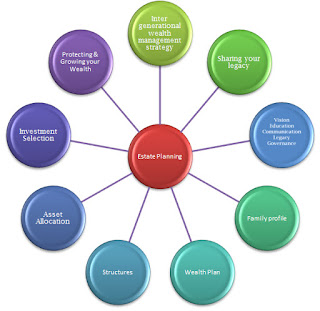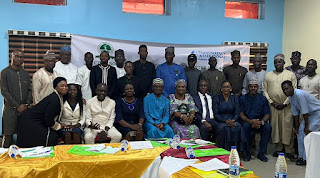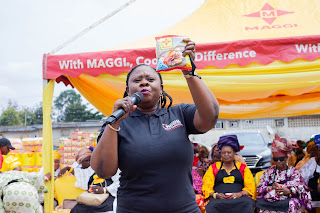More Children Will Suffer Abuse As Impunity Remains High
By Chioma Umeha
Recently, Independent spotted a teenager, at 6:00
pm, with bruises all over her body even as blood dripped from her ears at
Cardioso Street, close to popular Olodi-Apapa, Lagos.
Dolapo, as she simply identified herself struggled
to respond to interrogation about her injury.
“I live with my Aunty at No. 10, Cardioso Street
and she said; ‘I must find the money,’ she became mute in between talks, while
trying to fight back tears.
A passerby who claimed to be a neigbour, told
Independent that Dolapo assists her ‘Aunty,’ a petty trader to hawk ‘pure
water.’’
“Maybe Dolapo misplaced some of the proceeds from
the day’s sales. She has become an object of constant beating; this is not the
first time. We always hear the woman shouting and beating the girl everyday. We
heard her shouting around 4:00pm, ‘you must bring the whole money from the
‘pure water’ you sold,” the passerby added.
House helps are not the only victims of physical
violence. Parents often mete out violence against their children in a bid to
discipline them.
Still fresh in the memory of Nigerians is the case
of Mr. Chris Elvis, computer accessories dealer, who allegedly beat his
four-year-old son to death, padlocking his mouth to prevent him from shouting
while the beating lasted.
He claimed that Godrich, his son, was an Ogbanje –
evil child that dies and reincarnates repeatedly and beat him with an object
that inflicted deep cuts all over his body until he died.
Many cases of this magnitude are happening on a
daily basis across the country, but have been swept under the carpet, due to
several factors. These include ignorance, family pressure, poverty, threats,
religion, tradition, lack of laws and others.
For instance, Mr. Adeniji Kazeem, the Lagos State
Attorney-General and Commissioner for Justice, recently said the state in the
last one year handled 4,035 cases ranging from rape, child abuse, sexual
assault, sexual abuse, defilement, divorce, matrimonial issues, child’s custody
and maintenance.
Also, within the same period, the Gombe State
Ministry of Women Affairs and Social Welfare said it handled 66 cases of child
abuse in eight months.
Available data also shows that violence against
children is on the increase in Nigeria. A survey conducted by the National
Population Commission, (NPoPC), with support from the United Nations Children’s
Fund (UNICEF), and the US Centres for Disease Control and Prevention, shows
that millions of Nigerian children suffer violence every year.
The survey stated that approximately six out of
every 10 children in the county experience one of these forms of violence before
they reach 18.
The NPoPC, in its 2014 national survey on violence
against children in Nigeria made available to Independent, stated that the
majority of children who experience physical, sexual or emotional violence in
childhood do so on multiple occasions.
Presenting the report recently, at a media
dialogue on End Violence Against Children (EndVAC) campaign, organised by the
UNICEF in Ibadan, Oyo State, Sylvanus Unogu, Deputy Director, planning and
research, NPoPC said over half of children first experienced physical violence
between the ages of 6 and 11 with approximately one in 10 children having first
experience of physical violence under the age of five.
“Girls are significantly more likely to experience
both sexual violence and physical violence than other combinations of
violence,” he added.
Onogu regretted that children are not speaking
out, seeking or receiving services; stressing violence has a serious impact on
girls’ and boys’ lives and future.
“Sexual violence is associated with higher risk
for symptoms or diagnosis of sexually transmitted infections (STIs) mental
distress and thoughts of suicide among females and with mental distress among
males,” he said.
Onogu therefore called for stiffer penalties and
measures against those found guilty as violators of children rights.
Similarly, Sharon Oladiji, child protection
specialist with the UNICEF, raised an alarm over increasing cases of violence
against children in Nigeria.
Oladiji said a survey by the UN body for children
matters indicated that the rights of a many Nigerian children were being
violated.
She attributed the increasing rate of child abuse
to the absence of institutions to check the trend.
According to her, the need to establish a Family
Court has become necessary to severely deal with perpetrators of violence
against children.
Oladiji, who explained that the court would
specifically deal with perpetrators of violence against children, identified
violence to include emotional, physical and sexual acts.
She decried the failure of a lot of families
affected in such situations to speak out when their children or wards were
violated by relations.
She said that a lot of children became prey to
perpetrators of violence because of the failure of parents or guardians to
allow them have a say in matters affecting their lives.
The child protection specialist said because of
the failure of society and the government to punish perpetrators of the acts
adequately, they did not see anything wrong in their actions.
According to her, lapses by the government and
families have further encouraged perpetrators to continue in their acts.
Oladiji called for early reporting of cases toward
reducing the trend.
She said that the N500, 000.00 fine or five years
imprisonment for perpetrators of sexual abuse and unlawful sexual intercourse,
among others, enshrined in section 34 of the Child’s Rights Act, was mild.
Oladiji appealed for a stiffer penalty, such as
death sentence, for offenders to deter prospective violators.
According to her, establishment of the courts,
existence of champions that will champion the cause of children whose rights
have been violated, among others, will check the excesses of offenders.
“At the moment, the impunity is high; people do it
and get away with it.
“There is no court system that specifically deals with
all kinds of perpetration or perpetrators and as enshrined in that law.
“What we need is to speak about it and encourage
our government to establish it; it may not be as costly as you think.’’
The expert highlighted some provisions of the
Child Rights Act to include right to survival, development, protection and
participation.
According to her, the protection right is
essential for safeguarding children and adolescents from all forms of abuse,
neglect and exploitation.
CRA enacted on July 2003, is meant to protect the
child from all sorts of violation.




Comments
Post a Comment